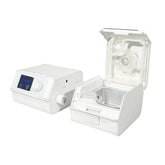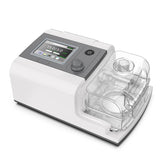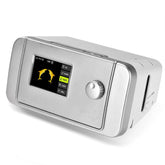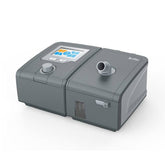CPAP or APAP Which One is Better for You?
If you suffer from sleep apnea, you may have heard of two popular treatment options: CPAP and APAP. Both of these treatments involve wearing a mask over your nose and/or mouth while you sleep to deliver continuous positive airway pressure (hence the name CPAP) to keep your airway open and prevent interruptions in breathing.
But how do you know which option is right for you? In this blog post, we'll explore the differences between CPAP and APAP and help you determine which one may be better suited for your needs.
What is CPAP?
CPAP stands for Continuous Positive Airway Pressure. This is the most commonly prescribed treatment for sleep apnea. It involves wearing a mask over your nose and/or mouth while you sleep, which is connected to a machine that delivers a continuous stream of air to keep your airway open.
The air pressure is set to a constant level, determined by a sleep specialist or physician, which is based on the severity of your sleep apnea. The pressure ensures that your airway stays open throughout the night, which helps to prevent snoring and apnea episodes.
What is APAP?
APAP, or Automatic Positive Airway Pressure, is similar to CPAP, but with one key difference. While CPAP delivers a constant air pressure, APAP machines are designed to automatically adjust the pressure throughout the night based on your breathing patterns.
APAP machines use sensors to monitor your breathing and adjust the pressure accordingly. This means that if you need more pressure to keep your airway open, the machine will deliver it automatically. Conversely, if you don't need as much pressure, the machine will lower the pressure to a more comfortable level.
Which one is better for you?
So, which one is better for you? The answer to that question depends on a few factors, including the severity of your sleep apnea, your personal preferences, and your budget.
If you have severe sleep apnea, CPAP may be the best option for you. CPAP delivers a constant pressure that is specifically tailored to your needs, ensuring that your airway stays open throughout the night. It's also typically less expensive than APAP machines.
On the other hand, if you have mild to moderate sleep apnea, or if you find the constant pressure of CPAP uncomfortable, APAP may be a better option for you. APAP machines are designed to adjust the pressure throughout the night, which can make them more comfortable to use.
Additionally, if you travel frequently or want a more portable option, APAP machines are typically smaller and easier to transport than CPAP machines.
Conclusion
In the end, the decision between CPAP and APAP comes down to personal preference, severity of sleep apnea, and budget. Both treatments are effective at treating sleep apnea, and your doctor can help you determine which one is right for you.
If you're still unsure which option to choose, it's always best to consult with your healthcare provider or a sleep specialist. They can help you weigh the pros and cons of each treatment option and make an informed decision that is right for your individual needs.







